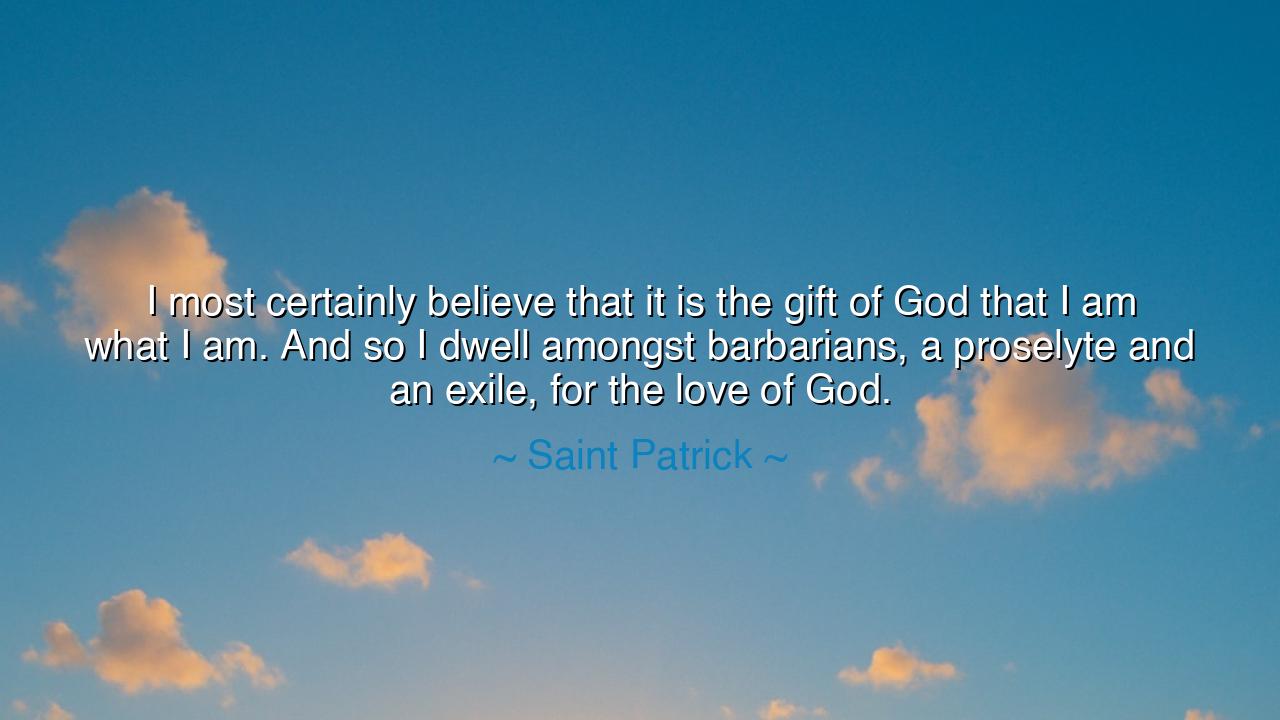
I most certainly believe that it is the gift of God that I am
I most certainly believe that it is the gift of God that I am what I am. And so I dwell amongst barbarians, a proselyte and an exile, for the love of God.






"I most certainly believe that it is the gift of God that I am what I am. And so I dwell amongst barbarians, a proselyte and an exile, for the love of God." Thus spoke Saint Patrick, the shepherd of Ireland, whose faith burned brighter than the green hills and whose humility reached deeper than the seas that carried him. In this sacred confession, he reveals both his gratitude and his surrender—the acknowledgment that his life, his mission, his very identity were not his own, but the gift of God. Here speaks not the conqueror or the scholar, but the servant—the man who, once enslaved, became the messenger of divine freedom.
The origin of these words lies in Patrick’s Confessio, his written testament to faith and purpose. Born in Britain in the fifth century, he was taken captive as a youth and sold into slavery in pagan Ireland. There, in loneliness and hardship, he discovered the presence of the living God. His captivity became his conversion, his chains became his calling. After escaping and returning home, he might have lived in comfort, but instead he heard the call of heaven: to return to the very land of his bondage, not as a slave, but as a servant of love. And so, with courage born of grace, he crossed the sea once more—not for conquest, but for compassion.
When Patrick says, “It is the gift of God that I am what I am,” he speaks the language of the soul that knows humility. He takes no pride in his mission, no credit for his strength, no glory in his success. Every breath, every word, every act of love—he attributes to divine mercy. This is the heart of sanctity: to see oneself not as the source, but as the vessel. In Patrick’s eyes, all goodness flowed from God’s gift, not man’s will. And thus, though he stood among those who once enslaved him, he called them not enemies, but beloved souls, for he saw them through the eyes of grace.
“And so I dwell amongst barbarians,” he continues—not as a complaint, but as a declaration of faith. To dwell among those who do not know the light, and to love them without judgment, is the true test of the disciple. Patrick lived among those who mocked his God and misunderstood his purpose, yet he remained steadfast. His love did not waver; his mission did not fade. For he knew that to serve God is to go where love is needed most, even if it means becoming a stranger, a proselyte, an exile. He had left the comforts of home and culture, but he had found his homeland in the heart of God.
Consider the story of Francis of Assisi, who centuries later walked the same path of divine surrender. Born to wealth and privilege, Francis renounced everything to live among the poor, calling himself a pilgrim and stranger on the earth. When asked why he embraced such poverty, he answered, “Because what I am is God’s, not mine.” Like Patrick, Francis understood that holiness lies not in power but in love—love so deep it embraces those the world calls unworthy. Both men turned exile into ministry, isolation into illumination, because they lived for something beyond themselves: the love of God.
Patrick’s words also reveal the paradox of true faith: that to serve the divine often means walking alone. The one who loves God fully must be willing to live as an exile among men—to be misunderstood, rejected, and yet unwavering. But such exile is not emptiness—it is sacred belonging. The world may cast out the servant of truth, but heaven gathers him in. For Patrick, dwelling among the “barbarians” was not degradation, but sanctification; it was the place where love proved its power, where darkness bowed before light.
And so, my listener, take this teaching into your heart: whatever you are, be it by the gift of God. Do not despise your hardships, for they may be your conversion. Do not fear exile, for it may be your mission. Wherever you are placed—among strangers, among doubters, among the broken—remember that you are there not by accident, but by calling. Love as Patrick loved: without condition, without pride, without fear. Let gratitude be your prayer, and service your offering.
For in the end, Saint Patrick’s wisdom is eternal: that to live for the love of God is to live beyond self, beyond comfort, beyond nation or name. The true follower becomes both exile and heir—cast out from the world’s illusions, yet dwelling forever in divine purpose. So when you find yourself among those who do not understand you, remember Patrick’s voice across the centuries: “I am what I am, by the gift of God.” And in that remembrance, every place becomes holy ground, every heart a homeland, and every act of love a light in the wilderness.






AAdministratorAdministrator
Welcome, honored guests. Please leave a comment, we will respond soon